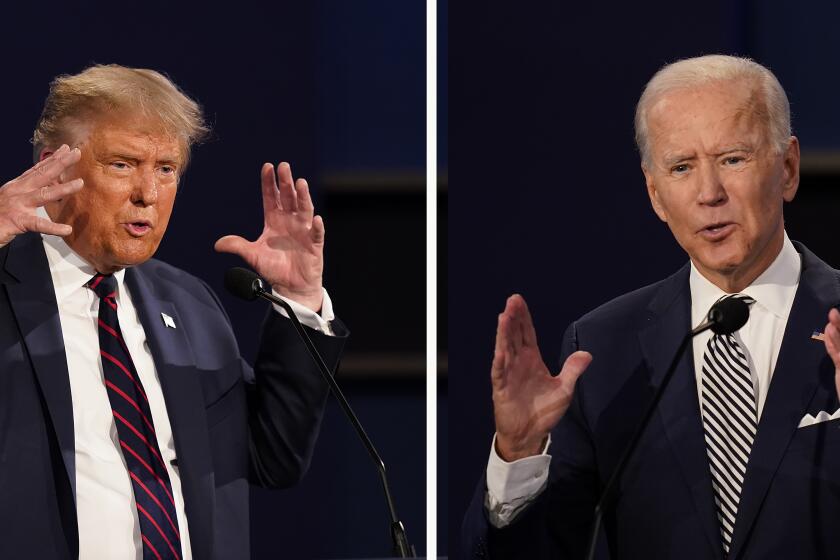Netanyahu Seeks to Appease Jordan Over Gaffe
When King Hussein of Jordan died three weeks ago, officials were quick to declare that relations between Israel and Jordan, Israel’s best friend in the Arab world, would remain close and cordial.
On Sunday, Israeli Prime Minister Benjamin Netanyahu had to work hard to preserve that friendship after making comments last week that appeared critical of the late king and provoked uproar here and in the Jordanian capital, Amman.
For his first official meeting with Hussein’s heir, King Abdullah II, Netanyahu traveled to Amman, discussed trade and water--and reassured his hosts that he meant no disrespect to the dead monarch nor to the still-mourning monarchy.
Speaking to reporters after the two-hour talks, Netanyahu was effusive in his praise for the new young king and seemed to bend over backward to express confidence in the Jordanian regime.
“I was very much impressed with his leadership and with the fact that he is continuing very clearly the policies of the late King Hussein, the policies of peace and stability,” Netanyahu said. “I think he is a wise leader, an able leader of a stable country and one that has stable, strong, durable relations with Israel.”
And so the Israeli prime minister hoped to defuse a potential crisis he himself had ignited. In truth, it was not so much the substance of what Netanyahu had said--seemingly questioning Jordan’s commitment to peace with Israel--but the timing of it, on the eve of an official visit to Jordan.
It was, in the words of one Israeli politician, “diplomacy a la Schwarzenegger.”
The episode began Thursday, when Netanyahu, in a speech at an Israeli university, recalled Hussein’s ultimately disastrous decision to side with Iraqi President Saddam Hussein during the 1991 Persian Gulf War and seemed to suggest that something similar could happen again. Netanyahu warned that a nuclear-armed Iraq would pose a “contiguous threat on our eastern border from the suburbs of Tel Aviv to Baghdad.”
Although Netanyahu’s aides say the prime minister didn’t mean it that way, the comments seemed to highlight neighboring Jordan’s strategic weakness and question its ability, or willingness, to stick to the peace treaties it has signed.
Jordanians reacted angrily. Government officials in Amman demanded “clarifications” of Netanyahu’s comments. The semiofficial Jordan Times said Netanyahu’s words “demonstrate his utter contempt for Jordan.”
Netanyahu spent the subsequent days insisting that he had been misinterpreted, and aides said the whole thing was being blown out of proportion in an election season.
“It was not the most felicitous thing to say a couple of days before going there,” a senior aide acknowledged, noting that Netanyahu’s intention was merely to warn of the regional danger posed by Iraq.
Israeli politicians were just as eager as the Jordanians to criticize Netanyahu.
“He is an elephant in a china shop,” said Shlomo Ben-Ami, a prominent legislator from the opposition Labor Party. “There’s only one Arab state in the world where Netanyahu is welcomed, and he just gave that another blow.”
Or, as commentator Hemi Shalev put it in Israel’s Maariv newspaper: “There are only a handful of statesmen throughout the world whom Netanyahu has not insulted . . . beginning with President Bill Clinton and ending with Yasser Arafat. New King Abdullah is the latest member of a club which is very prestigious but certainly not exclusive.”
Even the generally pro-government Jerusalem Post said Sunday: “It is not clear what is a worse diplomatic faux pas for a prime minister, deliberately insulting a country you are about to visit, or doing so by mistake. . . . Once again, Netanyahu has shown that experience on the job has still not inoculated him against making embarrassing mistakes.”
Jordanians were already suspicious of Netanyahu, whom they blame for stagnation in Arab-Israeli peacemaking and for a 1997 assassination attempt in Jordan against a militant Islamic leader.
This latest verbal miscue is not likely to cause lasting damage to Israeli-Jordanian relations. After Sunday’s talks in Amman’s Raghadan Palace, the Jordanian prime minister, Fayez Tarawneh, said he was appeased. And the two sides agreed to a Jordanian request to expand the list of products Jordan can export to Palestinian-controlled territories.
But Netanyahu’s comments will exacerbate Jordanians’ suspicions, said Shimon Shamir, Israel’s first ambassador to Jordan.
“The two sides will do everything possible to gloss over the difficulties and move ahead,” Shamir told Israeli radio. “I don’t see much damage in their immediate relations, but the damage done in the Jordanian public is irreparable.”
More to Read
Start your day right
Sign up for Essential California for news, features and recommendations from the L.A. Times and beyond in your inbox six days a week.
You may occasionally receive promotional content from the Los Angeles Times.







